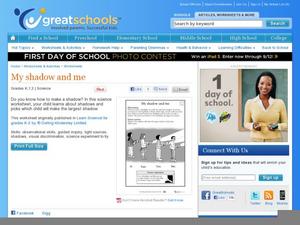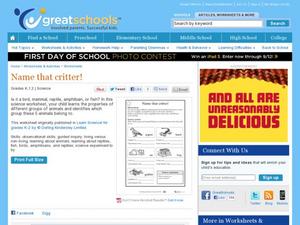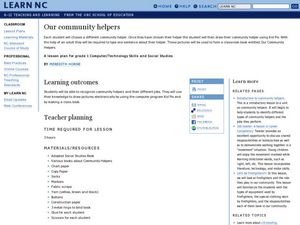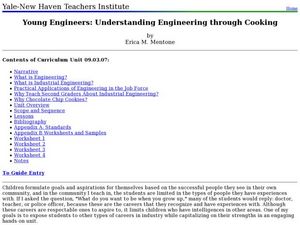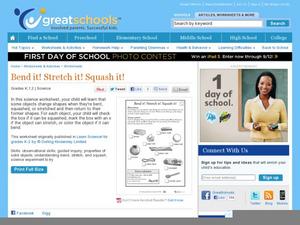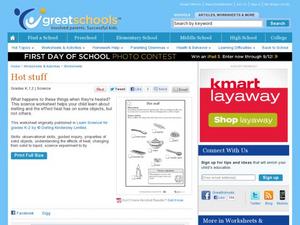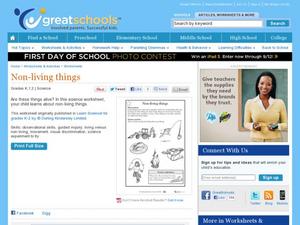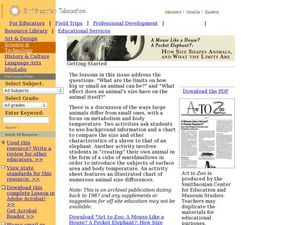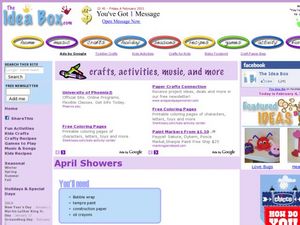Curated OER
Getting nosy
A nose knows! Connect animals to their noses with a fun science activity. Animals include elephants, rats, pigs, and even humans. For a science exploration, kindergartners answer questions about what they can smell. A great addition to...
Curated OER
My Shadow and Me
Practice making shadows with a kindergarten science experiment. After deciding which picture would represent the biggest shadow, kids use a flashlight to experiment with their own shadows. For extra fun, have kids mark their shadows...
Curated OER
Name That Critter
Young learners classify five different animals into their proper category. The animals pictured are a pigeon, a lizard, a cat, a frog, and a goldfish. Pupils are also asked to tell why they know it's a certain kind of animal. An...
Curated OER
Children's Literature Across the Curriculum Ideas-If You Made A Million
Pupils read If You Made A Million by David M. Schwartz. They complete a variety of cross-curricular activities surrounding the study of earning, saving and spending money. Included are reading, art, math, science, writing, social...
Curated OER
Count on Science & Math for Your Future
Young scholars complete a variety of classroom and online activities designed to teach them the importance of science and math in all career paths and stimulate their awareness and interest in various careers.
Curated OER
"Our Community Helpers"
Students define the term community. They list many, varied, and unusual jobs (careers) that people might have in our Communities. Students identify the purpose of the work done by their parents-either in the home, or outside of the home....
Curated OER
Backwards Writing: Reflections and Symmetry
Why is "ambulance" written backwards on emergency vehicles? Young geometers apply principles of symmetry to translate words written backwards. See if your school or district subscribes to Jobland, where you can view a clip that explains...
Curated OER
How does Paper Making Contribute to Economics
Second graders investigate the numerous jobs it takes to create paper in the U.S. In this economics instructional activity, 2nd graders discuss where paper comes from, what types of trees are needed, and how the paper milling...
Curated OER
Young Engineers: Understanding Engineering Through Cooking
Second graders explore different engineering careers. In this math lesson, 2nd graders create a winning cooking recipe. They role play a mock cookie sale during the culminating event.
University of Kansas
Newspaper in the Classroom
Newspapers aren't only for reading—they're for learning skills, too! A journalism unit provides three lessons each for primary, intermediate, and secondary grades. Lessons include objectives, materials, vocabulary, and procedure, and...
Curated OER
Computer Olympics
Students compete to achieve excellence in math facts, writing terms, problem solving, and writing skills on the computer. In this Computer Olympics lesson plan, students practice the skill of drill and practice in order to succeed and...
Curated OER
Bend It! Stretch It! Squash It!
Some items keep their shape no matter what happens! Have your kindergarten class choose which items would stay the same if they were bent, stretched, or squashed. The last activity prompts kids to see what happens when they stretch a...
Curated OER
Plants have needs, too!
Plants can die if they don't get enough sunlight and water. Kindergartners observe a picture of a hanging plant and grass under a tree, and interpret which each plant has died. Next, they grow watercress seeds in wet cotton to compare...
Curated OER
Growing
Growing is part of being a living thing. Kindergartners decide which illustrations represent the life cycle of a living thing, then put a check mark next to the correct pictures. They then examine their own growth on a height chart.
Curated OER
Ring-A-Ding-Ding!
What sound does metal make when you hit it? Kindergartners and first graders conduct an experiment about the properties of metal. First, they draw a line between metal items and descriptions of each. Next, they use a magnet to see which...
Curated OER
Hot Stuff
Very young scientists who are learning about solids, liquids, melting, and freezing will use this worksheet to identify things that would melt if put in a warm place. There are eight objects altogether, and learners place a check mark...
Curated OER
Non-living Things
Very young scientists circle the things on the worksheet that they think are living things. Most of the pictures are of non-living things. A handy worksheet to use during any initial discussion about living vs. non-living things.
Curated OER
Children's Literature Across the Curriculum Ideas-Lilly's Purple Plastic Purse
Students read Lilly's Purple Plastic Purse by Kevin Henkes. They complete a variety of cross-curricular activities surrounding events of the story. Included are reading, art, math, science, writing, social studies, and library connections.
Carson-Dellosa Publishing
Boho Birds Bulletin Board
Maybe you're studying the life cycle of a bird, or maybe you're doing an author study in language arts. Whatever the case may be, use a set of bulletin board ideas any time of the year. Tailor the provided ideas to make them your...
Curated OER
How Size Shapes Animals
Students investigate how size affects large and small animals differently. In this animal lesson plan, students determine how size affects different animals by constructing their own animal out of marshmallows. Once students create...
Curated OER
April Showers
In this April showers worksheet, students assist a raindrop in finding the best route to get through a maze to get to the flowers. Students color the raindrop and the flowers with appropriate colors.
Curated OER
Dinosaurs Were Real!
Young scholars investigate the history of dinosaurs, as real animals. In this dinosaur lesson plan, students examine basic concepts that help them understand the history of all life. Included in this article is information on the world...
Curated OER
Lift and Drag: Principles of Flight and the Soaring Imagination
Students construct models of early gas balloons and gliders. In this balloon and glider instructional activity, students create models of early gas balloons and gliders, discover how the forces of lift and drag effect aircraft in...
Curated OER
Look Ma! I'm a Rocket Scientist!
Students use a ball to push and pull to demonstrate the concept of force. In this force lesson plan, students talk about the importance of force in space and use balls to demonstrate this phenomena.

